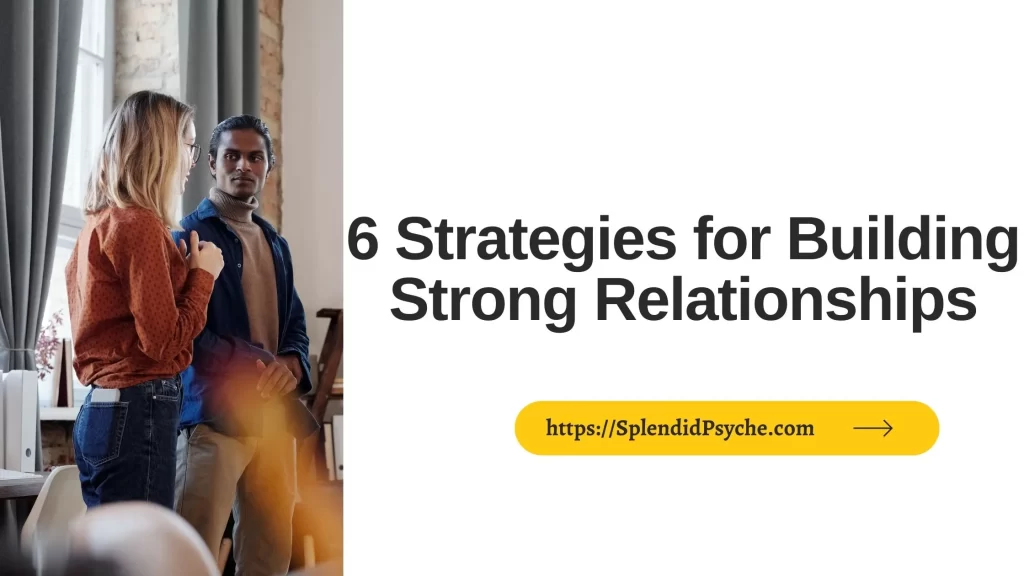Relationship Building: The Secret to Success in Both Personal and Professional Life
In our fast-paced, interconnected world, the ability for strong relationship building is more important than ever before. Whether in our personal lives or professional careers, the connections we forge with others can profoundly impact our well-being, happiness, and overall success. Relationship building is an art that requires patience, empathy, and a genuine desire to understand and connect with those around us.
At its core, relationship building is about fostering trust, respect, and mutual understanding. It involves taking the time to listen, communicate effectively, and find common ground with others. By nurturing these connections, we create a supportive network that can open doors to new opportunities, provide valuable insights, and enrich our lives in countless ways.

Personal Relationships
Building strong personal relationships is essential for our emotional and mental well-being. These relationships offer us the basic human needs of love, support, and a sense of belonging. When we invest time and energy into building relationships with family, friends, and loved ones, we create a safety net that can help us navigate life’s challenges and celebrate its joys together.
One of the key elements of building personal relationships is open and honest communication. This means actively listening to others, expressing our thoughts and feelings clearly, and being willing to have difficult conversations when necessary. By creating an environment of trust and understanding, we can deepen our connections and foster a sense of intimacy that strengthens our bonds.
Another crucial aspect of building personal relationships is making time for quality interactions. In our busy lives, it’s easy to get caught up in the daily grind and neglect the people who matter most. Scheduling regular catch-ups, sharing meals together, or engaging in activities you both enjoy can help strengthen your connections and create lasting memories.
Professional Relationships
In the professional world, building relationships is equally important. Strong professional relationships can open doors to new career opportunities, provide valuable mentorship and guidance, and create a supportive network that can help you navigate the challenges of the workplace.
Building professional relationships starts with networking. Attending industry events, joining professional organizations, or simply reaching out to individuals who share your interests or expertise can help you expand your circle and connect with like-minded professionals. However, effective networking is not just about handing out business cards; it’s about actively listening, finding common ground, and establishing genuine connections.
Once you’ve established initial connections, it’s important to nurture and maintain those relationships. This can involve setting up regular check-ins or meetings, sharing valuable resources or insights, and staying engaged with the individuals in your professional network. Building trust and demonstrating your expertise and reliability can help solidify these relationships and create opportunities for future collaboration or career advancement.
Relationship Building Strategies
While the importance of building relationships is widely recognized, the actual process of doing so can be challenging. Here are some effective strategies to help you strengthen your relationship-building skills:
- Practice active listening: Truly listening to others is essential for building strong connections. This means giving your full attention, avoiding distractions, and actively seeking to understand the other person’s perspective. Ask thoughtful questions, paraphrase what you’ve heard, and create an environment where open communication is encouraged.
- Show genuine interest: People can usually sense when someone is genuinely interested in them or just going through the motions. Make an effort to learn about the other person’s interests, goals, and experiences. Find common ground and shared passions, and engage in discussions that allow you to connect on a deeper level.
- Be authentic: Building authentic relationships requires vulnerability and a willingness to be your true self. Share your own experiences, thoughts, and feelings in a respectful and appropriate manner. This level of openness and honesty can help foster trust and strengthen the bond between you and the other person.
- Offer support and assistance: Relationships thrive when there is a mutual sense of support and helpfulness. Look for opportunities to offer assistance, share valuable resources, or provide encouragement and guidance to those in your personal or professional network. This not only strengthens your connections but also contributes to the growth and success of those around you.
- Celebrate wins and milestones: Building relationships is not just about supporting each other during challenging times; it’s also about celebrating successes and milestones together. Take the time to acknowledge and appreciate the achievements of those in your personal and professional circles. This simple gesture can go a long way in fostering a sense of camaraderie and strengthening your bonds.
- Be consistent and reliable: Consistency and reliability are essential for building trust and maintaining strong relationships. Follow through on your commitments, communicate clearly and promptly, and be someone that others can depend on. This level of dependability will not only strengthen your existing connections but also attract new ones.
Building Relationships in a Digital Age
In today’s digital landscape, building relationships often extends beyond face-to-face interactions. Social media, messaging apps, and video conferencing platforms have become integral tools for staying connected and nurturing personal and professional relationships.
While these digital tools provide convenience and accessibility, it’s important to strike a balance and not rely solely on virtual interactions. Face-to-face interactions, whenever possible, can help deepen connections and foster a level of understanding and rapport that can be challenging to achieve through digital means alone.
Additionally, it’s crucial to be mindful of how you present yourself and communicate online. Maintaining professionalism, being respectful, and avoiding misunderstandings or conflicts that can easily arise in the digital realm is essential for building and maintaining positive relationships.
The Benefits of Strong Relationships
Investing time and effort into building relationships can yield numerous benefits, both personally and professionally. Strong personal relationships can provide a sense of belonging, emotional support, and overall well-being. They can help us navigate life’s challenges and celebrate our successes with those who truly understand and care for us.
In the professional realm, building relationships can open doors to new opportunities, provide access to valuable insights and resources, and create a supportive network that can propel your career forward. Strong professional relationships can also foster collaboration, innovation, and personal growth, as you learn from and are inspired by those around you.
Ultimately, building relationships is about creating connections that enrich our lives and contribute to our overall happiness and success. By prioritizing empathy, authenticity, and a genuine desire to understand and support others, we can forge lasting bonds that transcend the boundaries of personal or professional spheres.
In a world that often emphasizes individualism and self-reliance, the importance of building relationships cannot be overstated. Whether personal or professional, the connections we forge with others can profoundly impact our lives, providing us with a sense of belonging, support, and opportunities for growth and success.
Relationship building is an ongoing process that requires patience, effort, and a genuine desire to connect with others. By practicing active listening, showing genuine interest, being authentic, offering support, celebrating wins, and maintaining consistency and reliability, we can strengthen our existing relationships and forge new ones.
In today’s digital age, it’s essential to strike a balance between virtual and face-to-face interactions, ensuring that we prioritize meaningful connections and foster a level of understanding that can be challenging to achieve through digital means alone.
Remember, building relationships is not just about what we can gain from others; it’s also about what we can contribute. By being supportive, generous with our time and resources, and truly invested in the success and well-being of those around us, we create a ripple effect of positivity that may significantly affect both our personal and professional life.
So, embrace the art of relationship building. Nurture your connections, foster trust and understanding, and watch as your life is enriched by the powerful bonds you create with others. In doing so, you’ll not only pave the way for personal and professional success but also contribute to creating a more connected, supportive, and thriving world.
Frequently Asked Questions
What is relationship building?
Relationship building refers to the process of establishing, nurturing, and maintaining connections or associations with others, whether in personal or professional contexts.
What is good building relationships?
Good relationship building involves actively listening, showing genuine interest and care for others, being reliable and consistent, offering support, celebrating successes together, and fostering an environment of trust, respect, and mutual understanding.
What is another word for building relationships?
Another term for building relationships is “networking.” This term is commonly used in a professional context, referring to the act of creating and maintaining connections within one’s industry or field.
Why is building relationships important?
Building relationships is important for several reasons:
- It fosters a sense of belonging, support, and community.
- Strong relationships can open doors to new opportunities, both personal and professional.
- Relationships provide valuable insights, guidance, and diverse perspectives.
- Nurturing connections contributes to overall well-being, happiness, and personal growth.
What is the most important aspect of relationship building?
Trust is the most crucial component in building relationships. Without trust, it is difficult to establish genuine, meaningful connections with others. Trust is built through consistent actions, reliability, open communication, and a willingness to be vulnerable and authentic.
Why is personal relationship important?
Personal relationships are important for several reasons:
- They provide emotional support, love, and a sense of belonging, which are fundamental human needs.
- Strong personal relationships can help individuals cope with stress, adversity, and life’s challenges more effectively.
- Personal connections enrich our lives with shared experiences, memories, and joy.
- Healthy personal relationships contribute to overall mental and emotional well-being, boosting self-esteem and life satisfaction.



